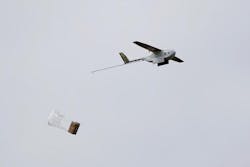Drones will be used to deliver life-saving blood to 21 transfusing facilities in Rwanda.
The Rwandan government last week began using drones to make up to 150 on-demand, emergency deliveries per day of life-saving blood to facilities located in the western half of the country.
The drones and delivery service are built and operated by Zipline, a Calif.-based robotics company.
While Rwanda’s drone delivery service will initially focus on blood, an international partnership between UPS, Gavi, the Vaccine Alliance, and Zipline will help the country quickly expand the types of medicines and lifesaving vaccines that can be delivered.
“The inability to deliver life-saving medicines to the people who need them the most causes millions of preventable deaths each year around the world,” said Zipline CEO Keller Rinaudo. “We’ve built an instant delivery system for the world, allowing medicine to be delivered on-demand and at low-cost, anywhere.”
The Global Problem
Throughout the developing world, access to lifesaving and critical health products is hampered by the last-mile problem: the inability to deliver needed medicine from a city to rural or remote locations due to lack of adequate transportation, communication and supply chain infrastructure.
In Rwanda, postpartum hemorrhaging is the leading cause of death for pregnant women. Blood requires storage and transport at safe temperatures and spoils quickly. Because there are many different blood products and no way to accurately project future needs, many transfusion clinics do not keep all the blood they may need in stock.
During Rwanda’s lengthy rainy season, many roads wash out becoming impassible or non-existent. The result is that all too often someone in need of a lifesaving transfusion cannot access the blood they need to survive.
The Solution
Rwanda’s national drone delivery program enables blood transfusion clinics across the Western half of the country to place emergency orders by cell phone text message. The orders are then received by Zipline at its at its distribution center located in the country’s Muhanga region where the company maintains a fleet of 15 drones, called Zips.
Each Zip can fly up to 150 km round trip—even in wind and rain—and carry 1.5kg of blood, which is enough to save a person's life. Zips take off and land at the Nest, and make deliveries by descending close to the ground and air dropping medicine to a designated spot called a “mailbox” near the health centers they serve. Zipline will make 50-150 emergency flights a day to 21 transfusion clinics across the Western Half of Rwanda and can fulfill orders in around 30 minutes.
Rwanda plans to expand Zipline’s drone delivery service to the Eastern half of the country in early 2017, putting almost every one of the country’s 11 million citizens within reach of instant delivery of lifesaving medicines.
Rwanda and Beyond
The commercial partnership between Rwanda and Zipline is expected to save thousands of lives over the next three years. Through this effort, Rwanda is leading the world by using cutting-edge technology to leapfrog the absence of road infrastructure and to provide cutting edge healthcare access to all its 11 million citizens.
The work in Rwanda is being further supported by a $1.1 million grant from the UPS Foundation which will allow the country to study blood drone delivery operation with an eye towards helping the country quickly expanding the types of medicines and vaccines that can be delivered.
Leveraging UPS’s extensive global supply chain and logistics expertise, Gavi’s deep public health and vaccine knowledge, and Zipline’s cutting edge last-mile delivery technology, the partnership hopes to use the knowledge gained in Rwanda and export it around the world.
UPS’s logistics expertise and resources are expected to play a critical role in helping the partnership to expand the reach of this important work. The company was actually able to transport the entire Zipline system from California to Rwanda in record time in a “Browntail” cargo plane, helping to ensure Zipline’s distribution center could be constructed in just four weeks.
“This project will also act as an important test for whether drones are a viable way to improve targeted vaccine delivery around the world ,” said Dr. Seth Berkley, CEO of Gavi, the Vaccine Alliance. “Every child deserves basic, lifesaving vaccines. This technology could be an important step towards ensuring they get them.”
Over the course of the next year Zipline plans to expand drone delivery services to countries across Africa and the Americas. Additionally, Zipline recently announced plans at the White House to expand it service to the United States, where it will serve Indian reservations in Maryland, Nevada, and Washington State.
Over the course of the next year, and with the support of the partnership with UPS and Gavi, Zipline plans to expand drone delivery services to countries across Africa and the Americas. Additionally, Zipline recently announced plans at the White House to expand it service to the United States, where it will serve Indian reservations in Maryland, Nevada, and Washington State.
